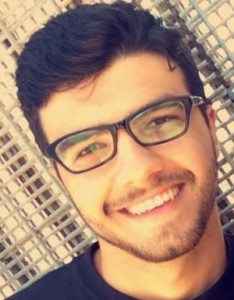Commitment to education as a human right
In 2010, Mohammad Al Hashmi—who goes by Odai—lived in the country of his birth, which was ranked as the fourth safest country on the planet. Before the war, its capital since ancient times placed fifth on the list of all-time great cities in the world in one heritage rating. Feeling blessed and proud to be a citizen of a beautiful country, Odai attended a university, studying to be an architect. He felt compassion for victims of wars and upheavals in other countries, but couldn’t really imagine what that must be like.
Then came the civil unrest that escalated into violence, and Syria and Damascus began their descent into hell. Hoping for a peaceful settlement, Odai helped with urgent humanitarian efforts while trying to continue his classes. His NGO supervisor expresses intense appreciation for Odai and his grasp of assessment, registration processes, distribution and other logistics, communication and organization skills, and information management. “Working with a team was one of the most educating, enriching, and fulfilling experiences I had,” Odai says. “With a good team and a good leader, anything is possible.” Even helping people, no matter how young or old, can be seen as a political act, however, so great care had to be taken.
One day, two of his fellow students were kidnapped on the highway as they returned home from classes, and Odai’s mother forbade him to attend any longer. “The experienced, educated, and intellectual people left the country,” Odai says.
In desperation, he applied to the Istanbul Technical University in Turkey, along with some five hundred other applicants. The city of Aleppo reported horrifying atrocities as it was becoming the most dangerous place in the world to be. Syrians went into shock. A deadly conflict began in Odai’s city as well. “From poverty to displacement to losing your home to the death of your loved ones, the people of my country have been through it all,” Odai says.
Many escaped from Syria, but “few are the countries that are now willing to let a Syrian citizen into their borders without a visa,” Odai says. “The sons of Syria are now looked down upon for the guilt of being forced to leave their homes.”
A year after leaving his university in Syria, Odai enrolled at the Istanbul Technical University, one of only eleven Syrian students accepted. He amazed his instructors with his ability to apply himself even though his family was still in Syria. One professor offered Odai’s “outstanding work” as examples to “enrich” other classes. “Research: he does…Ambition: he has…Curious: he is,” said his Berkeley-trained prof.
Humbled with gratitude by this opportunity to continue his education, Odai couldn’t stop thinking about all those individuals reclassified as refugees who were only a few classes away from becoming doctors, engineers, teachers, and entrepreneurs before being fleeing for their lives. With Syria’s best now gone, who would ever rebuild it? As a believer in Plato’s idea that all evil stems from ignorance, Odai became obsessed with education to the point of considering it a basic human right. And then something of a miracle happened. He connected with a team of individuals from Germany who are equally passionate about education, especially for refugees. Odai contributes his managerial skills along with his extensive knowledge of how to reach refugees and their needs, such as not being able to access any records from previous institutions.
This amazing team has created Krion, a college with no tuition or fees available to anyone with at least occasional access to the cloud on the internet. As they point out, world-class courses are already offered for free from universities like Harvard, MIT, Stanford, Yale, and many others, and Massive Open Online Courses (MOOCs) have become the number one trend in online education. Krion has enrolled 15,00 students for its opening in fall of 2015. Crowdsourcing has raised 50,000 Euros. Find out more about this innovation that could bring hope to refugees and possibly change the world at http://kiron.university/.
Through four years of war, 200,000 Syrians have been killed, according to the BBC, and eleven million have been displaced, and Odai asks who will prevent Syria from becoming another Iraq or Afghanistan? He says that being abroad on his own has taught him that “life is composed of two things: opportunities and choices.” Because of the opportunities he’s been given, Odai has chosen a life dedicated to his country. “I feel that it is my responsibility to rebuild my country from the ashes. I know that my people have faith in me and every young Syrian out there to get this beautiful country back on its feet once again.” When Odai applied for HSI, one of his wise mentors said that including him “would be a very good investment for humanity.”

